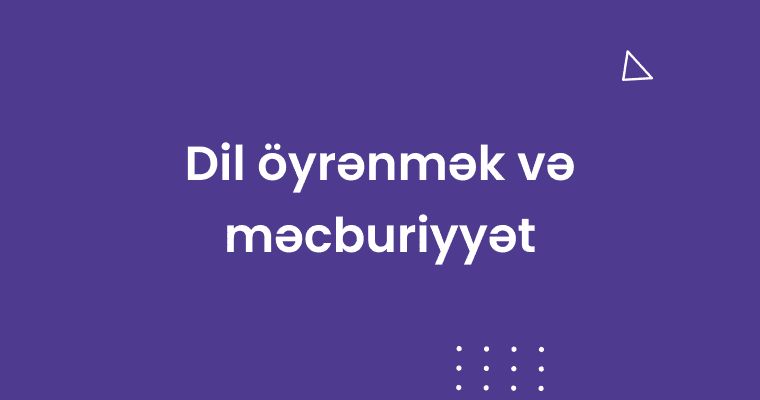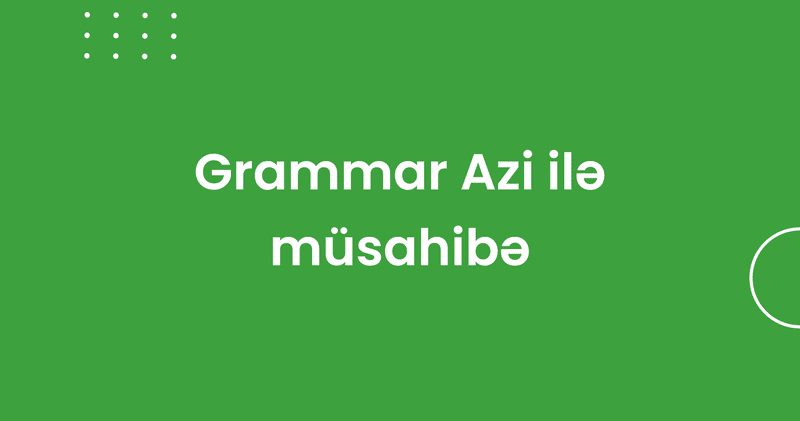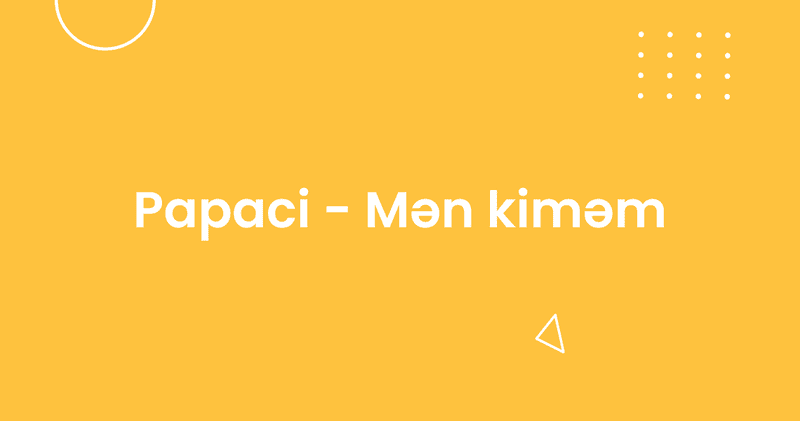
Dil öyrənmək və məcburiyyət
İnsan həyatda qalmaq uğrunda olduğu mühitə uyğunlaşmaq üçün möhtəşəm alətlərə sahibdir.
Dil öyrənmək
baxış
The language we learn since our childhood at home develops our identity. We cannot quickly change or replace our identities since language learning makes us realize our identities in different social environments. It reflects our nationality, ethnicity, race, gender, and so on. However, many people spend a lot of time learning foreign languages; they take language courses, download language apps, and do their best because knowing a second language is very important nowadays.
However, do we really know how to speak and write in our native languages?
Once I was reading a newspaper and I started to correct grammar mistakes in the article. When my grandma saw me, she said that back in the days, they were learning spelling and new grammar rules from newspapers, magazines, books, TV, etc. Unfortunately, some governments change their language policies very frequently; also, they add new rules and change spellings. If someone graduated a long time ago and does not work in the linguistic sphere, how can he learn about new rules? If people who work in the media do not know about changes, how could the rest of us possibly know them? The most powerful social media pedestal, Facebook answers the above-mentioned questions. In fact, after the development of technology, people began to watch Netflix instead of TV; people began to read Facebook news feeds instead of newspapers. This is the reason why the Grammar Nazi pages started to correct mistakes on social media. Grammar Nazi is a negative term used in modern online media to label people who conduct excessive language regulation but has also been ironically appropriated by groups of users who participate for entertainment purposes in analyzing the grammar of other people. There are two kinds of Grammar Nazis. The first group is the ones who make humoristic or sarcastic memes about grammatical errors, most of the time spelling mistakes. The second group Nazis’ main aim is to educate people, they correct mistakes on commercial news media, public signs, restaurant menus, etc. This group of people mainly have pages on Facebook or Twitter. Many people are following those pages, sharing and commenting on their posts, joining discussions, and even sometimes arguing very passionately. Grammar Nazi pages are tagging famous pages, politicians, singers, actors, journalists, and correcting their mistakes. Recently, the Grammar Azi page tagged Azerbaijani President’s official page and corrected their spelling mistake. If we look at the comment section, we can see how people appreciate their initiative. Besides, it is difficult to find any spelling mistakes in comments, and that proves people do not want to be judged by Grammar Nazis, therefore, they start to write and speak properly with the help of social media. There are different opinions about the Grammar Nazis. Are Grammar Nazis ‘guardians’ of the standard language? Are they ‘helpers’ of the Internet? Maybe they are a bunch of losers who just want to display their knowledge? Are they ‘pranksters’ who make fun of people who committed a mistake? Nelson (2014) argues that Grammar Nazis tend to receive more negative views from people compared to those who show other skills at Mathematics and they are never called 'Nazis’. Many articles on the Internet argue the same topic, The articles on the Guardian, Daily Mail claim that Grammar Nazis are losers and they just show off their knowledge of grammar, they insult people and they stick to the standard language. These people most of the time correct typos – crimes against orthography. However, some entertainment pages such as 9GAG, Owned.com, or SmartphOWNED.com. share screenshots of comments and text messages. To show off their smartness, some people guess who committed those grammar errors. Research conducted by Svelch and Sherman (2017) shows those ‘Nazis’ guess such mistakes could have been done by immigrants, women, or industry workers. From my point of view, those people are not true Grammar Nazis. As there are many articles on the Internet, which argue they are losers.
The Grammar Nazi phenomenon is symptomatic of language usage in digital media as a response to the democratization of written language and can be an appropriate lens through which to examine current debates on online written communication. However, neither media research nor linguistics has studied it extensively. It is a new media phenomenon, which, without sociolinguistic study, cannot be explained, and, at the same time, is a sociolinguistic phenomenon, which needs a systematic understanding of computer-mediated communication and online cultures. ‘Grammar Girl’ who is a famous blogger and has hundreds of thousands of followers on Twitter claims that ‘Grammarista’ is a positive name and ‘Nazi’ is a negative term. She does not use the famous ‘swastika’ symbol on her page and she calls people not to call themselves ‘Nazi’. I would like to mention educative Grammar Nazi pages which use ‘swastika’ as their symbol, but educate people by sharing articles about language policy, informing people about new rules in the language, ask people’s opinions about new rules and write articles about it, also share funny memes for entertainment. Azerbaijani Grammar Azi page is a great example of the above-mentioned description. Their symbol is ‘swastika’ with Azerbaijani flag colors, but because of their approach to the language, people do not judge them for their symbol. The Grammar Azi page argues if a standard language is a law to be enforced via policing or not. Examples of an online form of media participation, described by Carpentier (2003) as audience practices oriented towards equalization of power in society, could be seen as Grammar Nazi activities. Amateur enthusiasts who care about language and literacy and take their time to correct errors and inform others by producing and sharing content, similar to members and administrators of various online support, self help, and education communities, may view Grammar Nazi pages as the products of voluntary labor.
Nigar Yahyazada: How did you decide to open the Grammar Azi page on Facebook? Murad Huseynov: Our society's indifferent attitude towards the rules of the Azerbaijani language motivated me to take a step. We are not only talking about social networks but also the fact that many local and foreign organizations, which write in the Azerbaijani language do not follow the grammar rules in our language. Of course, I was not the only one who paid attention to this issue. I saw articles on the Internet and articles on social networks on this issue. But these posts and articles did not continue. They remained in writing. In 2016, one of my friends on Facebook shared a post about the correct spelling of different words, and in the comments section, users discussed the most common mistakes. I told him to invite me to the admin board if he ever opens a page on "Grammar Nazi". Another user commented that his message was ignored when he wrote about errors in the message section of the page that made a mistake in the article. In brief, considering all these points, I decided to open a Facebook page, and the information I received in that discussion helped me prepare the working principles of the page.
N.Y: Do you see the difference between your and foreign Grammar Nazi pages?
M.H: Let's not forget that "grammar nazi" is a concept related to internet folklore. That's why other so-called pages devote most of their humor to this topic. Other groups on this topic only share posts related to different writing rules. Grammar Azi differs from other pages in that everything here is more serious than them. A typo left by another page in Grammar Azi serves as a source of information for the followers of this page. In other words, the erroneous article is shared on the Grammar Azi page so that other viewers can see and learn from the mistake and avoid making the same mistake in their writing. As a result, users get informed about the different rules of writing in one post. To be honest, I haven't seen this method on other grammar nazi" pages, and I think that's the main difference. Of course, the page also has humorous and special posts only on the rules of writing.
N.Y: What are the attitudes of social media users?
M.H: Different groups of users approach the page differently. Some users think this page is intended to irritate other pages, but I must say that no page has been and will not be seen negatively on Grammar Azi. Because anyone can make a mistake in writing. Therefore, on the cover of the page, part of the aphorism of Father Seneca is written: "Errare humanum est...", which means "Humans will always make mistakes." You just need to correct the mistake. In fact, the number of users who like and support the page is many times higher than I expected when I created this page.
Famous quotes by grammar nazis
"It really is not that difficult to use correct spelling and grammar. Be professional and disciplined in everything that you do for the cause."
"I don't judge people based on race, creed, color, or gender. I judge people based on spelling, grammar, punctuation, and sentence structure."
"Everybody makes mistakes, but only some of them are acceptable. If their finger slipped on the keyboard and accidentally typed one thing instead of another, that's fine. But if they keep repeating the same mistakes, and there's no way their keyboard is the culprit, you know it's all their fault."
"It's not that hard to soothe a grammar nazi. All you have to do is use your words correctly. That's all we ask. It's not an unreasonable request, so we expect it to be obeyed."
Grammar Nazis, Grammar Police, or Grammaristas are all around us. When they correct your grammar, do not feel judged. They cannot stop themselves without correcting. It is not about who made a mistake; it is all about grammar and rules. Let's learn our nativelanguages better than any other language. Start from today, correct your own mistakes, and be a grammar nazi to yourself. If you do not, they will find and correct your typos or grammar. Maybe this time it will be me!
References:
Carpentier, N. (2003) The BBC’s Video Nation as a participatory media practice signifying everyday life, cultural diversity and participation in an online community. International Journal of Cultural Studies p. 425–447.
Driffill, R. (November 14, 2014) Confessions of a reformed Grammar Nazi. (theguardian.com/media/mind-yourlanguage/2014/nov/14/mind-your-language-grammar-nazi)
Fogarty, M. (August 17, 2017) Stop Calling Yourself a Grammar Nazi. (quickanddirtytips.com/education/grammar/stop-calling yourself-grammar-nazi)
Gray, R. (March 30, 2016) Are YOU a 'grammar Nazi'? You're probably a jerk: Language pedants Are more likely to be introverted and disagreeable. (dailymail.co.uk/sciencetech/article-3515520/Are-grammarNazi-Language-pedants-likely-introverted-disagreeable.html)
Nelson, E. (April 9, 2014). ‘Grammar Nazi’ a deplorable term. (suunews.com/news/2014/apr/09/grammarnazi-deplorable-term/)
Steven, P. (September 23, 2014) Why do grammar pedants miss the point? (bbc.com/culture/article/20140923-dont-be-a grammar-nazi)
Švelch, J., Sherman, T. (August 3, 2017). “I see your garbage”: Participatory practices and literacy privilege on “Grammar Nazi” Facebook pages in different sociolinguistic contexts. (journals.sagepub.com/doi/10.1177/1461444817719087)
7 Hysterical Quotes for Grammar Nazis (allwomenstalk.com)
2021-04-23
Bloqu paylaşın:

TIME ACADEMY dil mərkəzində aparıcı ingilis dili müəllimi, tərcüməçi, sosiolinqvist
Müəllifin digər bloqları
IELTS
Dil öyrənmək


İnsan həyatda qalmaq uğrunda olduğu mühitə uyğunlaşmaq üçün möhtəşəm alətlərə sahibdir.
Dil öyrənmək
baxış


Məşhur Grammar Azi səhifəsinin admini, Murad Hüseynovla müsahibəmi təqdim edirəm.
Linqvistika
baxış


Tarix boyu insanlar ölümlü dünyanın əzablarından və ötəri həzzlərindən doyub üzlərini mənəvi inkişaf yoluna çevirmişlər.
Spirituallıq
baxış